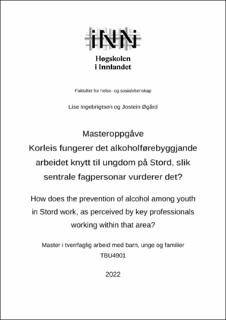Korleis fungerer det alkoholførebyggjande arbeidet knytt til ungdom på Stord, slik sentrale fagpersonar vurderer det?
Master thesis
Permanent lenke
https://hdl.handle.net/11250/3032948Utgivelsesdato
2022Metadata
Vis full innførselSamlinger
Sammendrag
Målsetjinga med studien er å få fram sentrale element ved alkoholførebyggjande arbeid ovanfor ungdom. Problemstillinga er difor som fylgjande: Korleis fungerer det alkoholførebyggjande arbeidet knytt til ungdom på Stord, slik sentrale fagpersonar vurderer det? Studien kan bidra til at offentleg tilsette som arbeider med ungdom, får auka si forståing og kunnskap om korleis dei kan bidra til at unge får ei trygg og god oppvekst. Me har nytta teori om tverrfagleg samarbeid, transaksjonsmodellen, i tillegg til risiko- og beskyttelsesfaktorar i tilnærminga av oppgåva. Me har også vist til nasjonal og internasjonal forsking på feltet, for å styrkje den faglege drøftinga. Me har gjort eit casestudie, og nytta kvalitativt intervju for å samle inn data. Me har intervjua åtte respondentar med ulike roller i det alkoholførebyggjande arbeidet på Stord. I tolking av intervjua har me latt oss inspirere av ei hermeneutisk-fenomenologisk tilnærming.
Studien konkluderer med ein stor samanheng mellom respondentane sine vurderinger og teori på feltet, angåande heilskapleg førebyggjande arbeid. Respondentane vektlegg i større grad samanhengen mellom kunnskap, haldningar og handlingar, enn settingen ungdommen tek vala sine i. Dette samsvara ikkje med teori og forsking på feltet, som seier at for mykje fokus på kunnskap, kan gå på kostnad av førebyggjande tiltak i miljøet (Burkhart et al., 2022). Respondentane oppgir at det tverrfaglege samarbeidet er godt på Stord, og at samarbeid mellom instansane er viktig for godt førebygggjande arbeid. Det finn støtte i rundskrivet førebyggjande innsats for born og unge (Barne-, likestillings-og inkluderingsdepartementet, 2013). Ruspolitisk handlingsplan er eit godt styringsdokument, som kan bidra til ei auka heilskapleg tenking ved at alle tiltaka er samla og vedteke politisk. Det føreset at dei tilsette er kjende med planen, og kva tiltak som kjem fram der. Ungdom sin trivnad i skulen, heimen og på fritida er beskyttande faktorar i høve bruk av alkohol (Øia, 2013; Nasjonal alkoholstrategi, 2021). Det gir stor grunn til å tru at dersom ungdom har aktivitetar dei trivast med på fritida, ein positiv skulekvardag og tillit til foreldra, vil det spegle seg att i mindre bruk av alkohol. Ut frå Ungdata (2021) ser ein at ungdom på Stord stort sett har det bra på alle arenaane, som styrkar vårt inntrykk av at ei heilskapleg tilnærming kan ha ei positiv effekt på ungdom sine oppvekstvilkår, som igjen påverkar deira alkoholbruk. The goal of this study is to highlight key elements in working with alcohol prevention amongst youth. Thus, the main question is: How does the prevention of alcohol among youth in Stord work, as perceived by key professionals working within that area? The study may contribute to increased understanding and knowledge on how youth workers in the public sector can help young people get a safe and good upbringing. We have approached the study through theories on interdisciplinary collaboration, the transaction model, as well as through risk and protection factors. We have also referred to national and international research to strengthen the professional discussion within the field. The research design builds on a case study, and we have used qualitative interviews to collect data. We have interviewed eight respondents with different roles within alcohol prevention work in Stord. When analyzing the data, we have been inspired by a hermeneutical-phenomenological approach.
The study finds a strong correlation between the input from the respondents and the theory within the field, when it comes to holistically framed prevention work. The respondents emphasize the link between knowledge, attitudes and actions more than the actual setting in which the youth make their choices. This does not correlate with theory and research in the field, which claims that too much focus on knowledge may compromise prevention work in the environment (Burkhart et al., 2022). The respondents state that the interdisciplinary collaboration in Stord is good, and that is vital in the prevention work. This is supported by the circular Preventive efforts for children and youth (Barne-, likestillings-og inkluderingsdepartementet, 2013). A substance policy action plan is a good managing assisting document. Since all the measures in it are collected and adopted politically, it can contribute to increased holistic thinking. A premise for that is that the employees are familiar with the plan and its measures.The well-being of youth in school, at home and in their spare time, are protective factors when it comes to use of alcohol (Øia, 2013; Nasjonal alkoholstrategi, 2021). It is likely that if the youth have activities that they are comfortable with, a positive school experience and have trust with/from their parents, it will mirror less use of alcohol. Based on the Ungdata study (2021), youth in Stord are more or less feeling good in all areas. This strengthens our impression that a holistic approach may have a positive effect on the environment of the youth's upbringing, in turn influencing their use of alcohol.
